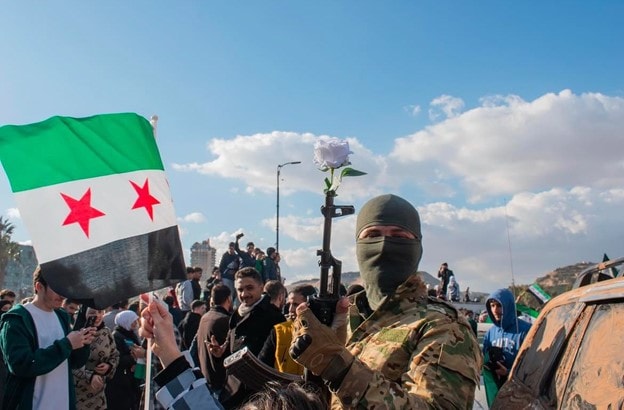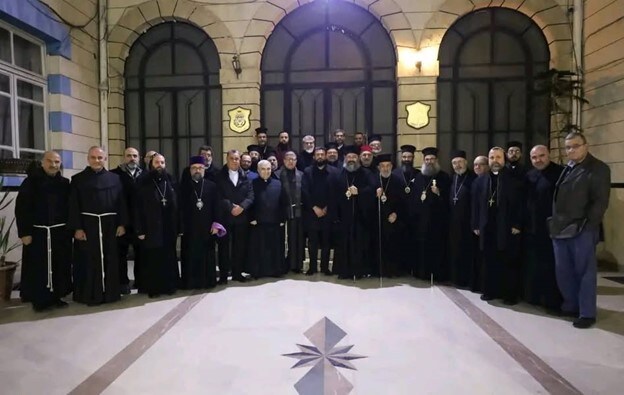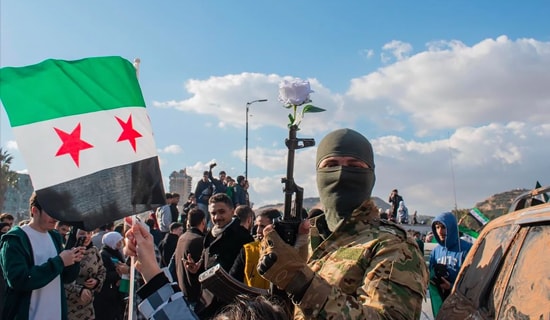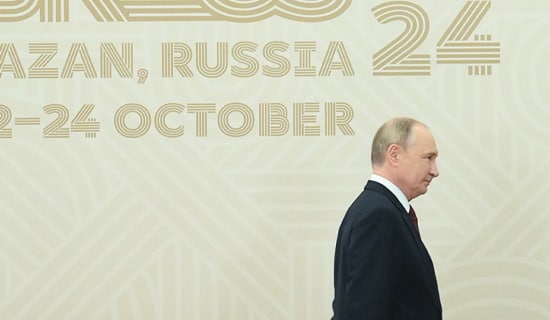Cities gripped by tyranny and poverty. A fractured country ruled by warlords and factions. A hollowed out middle class and threatened minorities fleeing. Jihadists in the countryside and a low-grade insurgency. Despair and crushed hopes. A safe haven for regional and global terrorism.

This was the reality of Syria in the last few years of the Assad regime and it is entirely possible that all of these conditions could also apply to a new Syria emerging under new management after the fall of Assad on December 8, 2024.
War and tyranny are certainly possibilities for Syria's future. But some of the criticism by pundits seems off, as if almost wanting Syria to fail. Many warn of the danger of an Islamic dictatorship ruling in Damascus but, of course, all Arab regimes are dictatorships or authoritarian states of some sort and several of them have had Islamist rulers.
Sunni Islamists have ruled Gaza (Hamas technically still does, amid the rubble of Yahya Sinwar's war), Egypt, and Sudan in recent years. All three regimes have ended in tears. In Gaza, Hamas won an election but then launched a bloody coup in 2007 against its Palestinian rivals and ruled with an iron hand while waging intermittent war against Israel. In Egypt, the Islamists won an election, ruled disastrously and were overthrown in a military coup in 2013 by an anti-Islamist army. In Sudan, the Islamists penetrated the army, launched a coup in 1989 and ruled disastrously for 30 years. They are trying to come back into power there.
But if anything concerns Arab rulers it is not so much Syria reverting to being a dictatorship – again – as it has been for most of the country's history since independence in 1946 and continuously from 1963 until 2024. Nor is it that it becomes another Arab "failed state." There are several of those already today – Sudan and Yemen come to mind, Lebanon also, perhaps. Assad's Syria was pretty disastrous and other states – current day Libya and Iraq – seem to have avoided becoming fully fledged failed states because of their oil wealth.
The greatest fear is not so much Syria reverting to type but actually the appearance of a new type of governance – that long-desired, oft-derided emergence of successful (or relatively successful) Sunni Islamist rule in one of the core countries of the Arab world. While the appearance of such a phenomenon in Syria is not at all assured, there is a distinct possibility of its emergence in Damascus in the near future.
The emergence of the Islamist Syria model, under someone like HTS leader Ahmed Al-Shar'a (Abu Muhammad Al-Joulani), has two powerful patrons: Turkey and Qatar. I am no admirer of either regime, as I have written repeatedly, but both bring invaluable expertise and clout to the potential success of an Islamist political project in Syria. Qatar brings cold, hard cash. Whatever Assad stole, Qatar can make up in hard currency deposits to the Syrian Central Bank. Turkey brings abilities as important as Qatar's contributions. They are raw military power and technical expertise and years of experience of (electorally successful) Islamist politics. Both Qatar and Turkey also know – and have been relatively successful at playing the West. They know what buttons to push and which to avoid.
The scenario would be something like this:
The interim period produces some sort of constitutional document guaranteeing certain freedoms and setting up UN-supervised democratic elections in 2025. The dynamic and modest 42-year-old Ahmed Al-Shar'a wins them easily and becomes Syria's first Sunni Muslim, non-Baathist President in 60-plus years.
He rules as a democratically-elected illiberal authoritarian but with a relatively light hand. He already controls the country's new military, which were the former Syrian Islamist rebels. There are already inklings that this sort of "Islamist Light" model would be his preferred path to follow. In a discussion from April 2023, Al-Shar'a discussed the drawbacks of following a Saudi or Afghan model of enforcing Islamic norms that he saw as unsuitable for Syria. The idea is to avoid a coercive society where people are hypocritically pretending to follow Islamic norms, instead relying on moral suasion rather than violent compulsion.[1]

A December 11, 2024 meeting between Islamist rebel officials and Damascus Christian clergy
In such a scenario, all non-Sunni Muslims are in an inferior position but that is also true in places like Turkey and Qatar. Ironically, Syrian Christians may be in the least bad position among non-Muslims given their utter political weakness inside Syria coupled with their relative importance to the West as a symbol of tolerance. Heterodox groups or pseudo-Muslims (Druze and Alawites) and Muslim secularists and free-thinkers would probably be in a far less favorable position.[2] Those are also groups of less significance in the West. Some observers expect that UNSC Resolution 2254 on Syria from 2015 would serve as some sort of constraint to either a victorious HTS or to a democratically elected Islamist government but that seems unlikely.[3]
There may not be a need for too much Islamist coercion anyway. In volatile revolutionary situations, there is often a critical mass of public opinion that wants even more radical steps to be taken as an opposite reaction to the previous regime. Islamism will now become fashionable in Syria, at least in the short run, and public demonstrations of Sunni Islamism will replace the space previously occupied by Assad regime idolatry. This revolutionary fervor will be less something ordered from above and more bubbling up from below.
We have a sense of how all of this could play out because we have the historical record of a decade of Islamist rule of rebel-held Idlib since 2015, especially since the Al-Shar'a-led HTS took all of Idlib city in July 2017. This is rule that was first more radical and disorganized but became more orderly and systematic over time but not without some degree of public dissatisfaction.[4] Many of the civilian officials put in place by Al-Shar'a in Idlib then are now in new positions of authority, as interim ministers, in Damascus. The combination of Al-Shar'a political savvy, Qatar's money and Turkey's security umbrella could actually succeed in delivering a better situation on the ground for most Syrians than the late-stage Assad regime. The new regime would be fortunate indeed that Assad has set the bar so low.
Such an outcome would be a threat to other countries. Not by failure but by success. Jordan, an authoritarian ally of the West with a restive, unhappy Sunni-majority population would be directly influenced by such events. Non-Islamist authoritarians in the region will be very unhappy at the success of such a provocative model.
This is one way the situation on the ground in Syria could possibly play out. But there are many unknowns. How firm is Al-Shar'a grip on his own forces? How essential is the man himself (I would think he is an extremely important part of this picture)? What if he is assassinated? Is the country too broken or chaotic beyond immediate repair? What happens if the country faces more war, either in the face of a growing ISIS insurgency or a neo-Baathist uprising (or both)? Can he find some sort of compromise with the heavily armed Syrian Kurds that satisfies them and is acceptable to his Turkish patrons?
One thing that seems likely is the new regime's stance toward Israel and even towards the United States. It will probably be relatively hostile but pragmatic, very much in the manner that both Turkey and Qatar are hostile toward those two countries – indirect, rhetorical, aspirational. There could even be short-term areas of congruence and indirect collaboration. Syria is in such bad shape that the regime needs peace in the short term even if it is to be resolutely anti-Israel. Some may want to see an HTS regime become a sort of aggressive Syrian Hamas and that is possible, but not immediately. The new Syrian regime will likely have relations with former Assad stalwarts Iran and Russia (just like Ankara and Doha do).
Some in the West are already calling for Syria's new rulers to jump through various "liberal, pluralistic" hoops as a precondition to Western recognition but it is not at all clear that Syria needs to do that. But it is possible that the new authorities in Damascus may want to at least go through the motions in order to satisfy an easily distracted international community already overburdened by multiple global, regional, and internal crises.
*Alberto M. Fernandez is Vice President of MEMRI.





